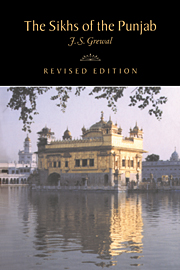Book contents
- Frontmatter
- Introduction
- 1 The Turko-Afghan Rule
- 2 Foundation of the Sikh Panth
- 3 Evolution of the Sikh Panth (1539–1606)
- 4 Transformation of the Sikh Panth (1606–1708)
- 5 Rise to political power (1708–1799)
- 6 The Sikh empire (1799–1849)
- 7 Recession and resurgence (1849–1919)
- 8 In the struggle for freedom (1920–1947)
- 9 Towards the ‘Punjabi Province’ (1947–1966)
- 10 In the new Punjab state (1966–1984)
- Bibliographical essay
- Index
- THE NEW CAMBRIDGE HISTORY OF INDIA
- References
5 - Rise to political power (1708–1799)
Published online by Cambridge University Press: 28 March 2008
- Frontmatter
- Introduction
- 1 The Turko-Afghan Rule
- 2 Foundation of the Sikh Panth
- 3 Evolution of the Sikh Panth (1539–1606)
- 4 Transformation of the Sikh Panth (1606–1708)
- 5 Rise to political power (1708–1799)
- 6 The Sikh empire (1799–1849)
- 7 Recession and resurgence (1849–1919)
- 8 In the struggle for freedom (1920–1947)
- 9 Towards the ‘Punjabi Province’ (1947–1966)
- 10 In the new Punjab state (1966–1984)
- Bibliographical essay
- Index
- THE NEW CAMBRIDGE HISTORY OF INDIA
- References
Summary
The eighteenth century in Indian history is known for the decline of the Mughal empire and the rise of successor states and new powers like the Marathas and the British. The rise of the Singhs into power during the eighteenth century was a part of this political process. But there was nothing in the process itself to ensure their rise to power. The combination of religious piety and disciplined worldliness that was evolved by Guru Nanak and elaborated by his successors was extended to the realm of politics by Guru Gobind Singh. The political struggle of the Singhs can be appreciated not merely in terms of the growing weakness of the Mughal empire but also as an extrapolation of the pontificate of Guru Gobind Singh.
Only about a year after Guru Gobind Singh's death, Bahadur Shah heard of a serious uprising in the Punjab and left the Deccan for the north. This uprising was led by Banda Bahadur who had met Guru Gobind Singh at Nanded and become his follower. He was commissioned to lead the Singhs in the Punjab against their oppressors. Some of the old followers of Guru Gobind Singh accompanied him, and he was also given letters (hukmnāmas) addressed to the Singhs for coming to his support. Banda Bahadur and his companions moved cautiously towards Delhi, entered the sarkār of Hissar and started collecting men and materials for military action. By November, 1709, they had gathered enough strength to storm the town of Samana in the sarkār of Sarhind.
- Type
- Chapter
- Information
- The Sikhs of the Punjab , pp. 82 - 98Publisher: Cambridge University PressPrint publication year: 1991



